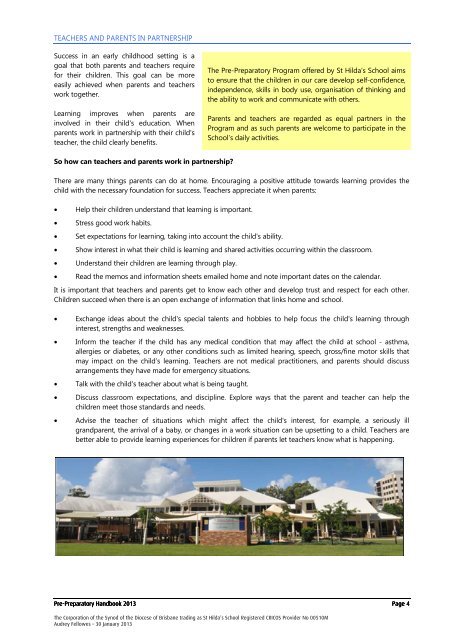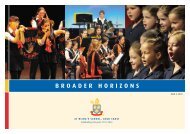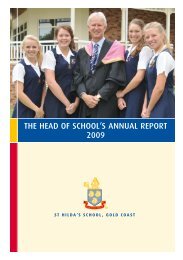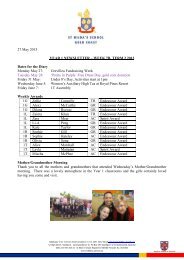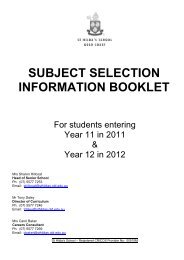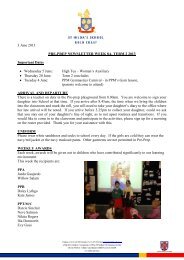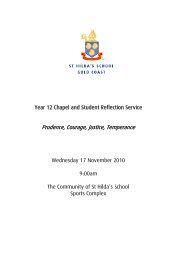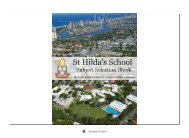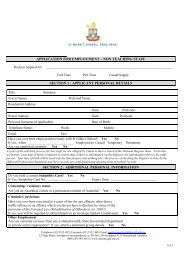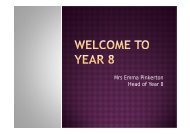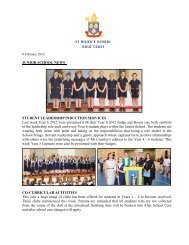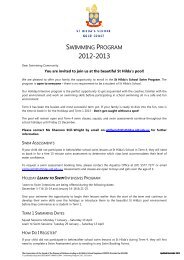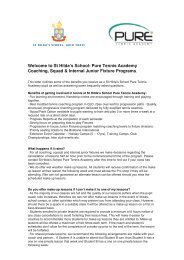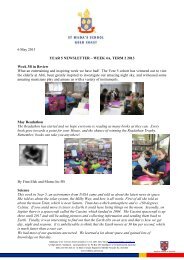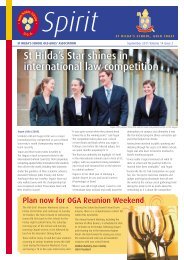Pre Prep Parent Handbook 2013 v9 - 31 January ... - St Hildas School
Pre Prep Parent Handbook 2013 v9 - 31 January ... - St Hildas School
Pre Prep Parent Handbook 2013 v9 - 31 January ... - St Hildas School
You also want an ePaper? Increase the reach of your titles
YUMPU automatically turns print PDFs into web optimized ePapers that Google loves.
TEACHERS AND PARENTS IN PARTNERSHIP<br />
Success in an early childhood setting is a<br />
goal that both parents and teachers require<br />
for their children. This goal can be more<br />
easily achieved when parents and teachers<br />
work together.<br />
Learning improves when parents are<br />
involved in their child's education. When<br />
parents work in partnership with their child's<br />
teacher, the child clearly benefits.<br />
The <strong>Pre</strong>-<strong>Pre</strong>paratory Program offered by <strong>St</strong> Hilda’s <strong>School</strong> aims<br />
to ensure that the children in our care develop self-confidence,<br />
independence, skills in body use, organisation of thinking and<br />
the ability to work and communicate with others.<br />
<strong>Parent</strong>s and teachers are regarded as equal partners in the<br />
Program and as such parents are welcome to participate in the<br />
<strong>School</strong>’s daily activities.<br />
So how can teachers and parents work in partnership?<br />
There are many things parents can do at home. Encouraging a positive attitude towards learning provides the<br />
child with the necessary foundation for success. Teachers appreciate it when parents:<br />
• Help their children understand that learning is important.<br />
• <strong>St</strong>ress good work habits.<br />
• Set expectations for learning, taking into account the child's ability.<br />
• Show interest in what their child is learning and shared activities occurring within the classroom.<br />
• Understand their children are learning through play.<br />
• Read the memos and information sheets emailed home and note important dates on the calendar.<br />
It is important that teachers and parents get to know each other and develop trust and respect for each other.<br />
Children succeed when there is an open exchange of information that links home and school.<br />
• Exchange ideas about the child's special talents and hobbies to help focus the child's learning through<br />
interest, strengths and weaknesses.<br />
• Inform the teacher if the child has any medical condition that may affect the child at school - asthma,<br />
allergies or diabetes, or any other conditions such as limited hearing, speech, gross/fine motor skills that<br />
may impact on the child’s learning. Teachers are not medical practitioners, and parents should discuss<br />
arrangements they have made for emergency situations.<br />
• Talk with the child's teacher about what is being taught.<br />
• Discuss classroom expectations, and discipline. Explore ways that the parent and teacher can help the<br />
children meet those standards and needs.<br />
• Advise the teacher of situations which might affect the child's interest, for example, a seriously ill<br />
grandparent, the arrival of a baby, or changes in a work situation can be upsetting to a child. Teachers are<br />
better able to provide learning experiences for children if parents let teachers know what is happening.<br />
<strong>Pre</strong>-<strong>Pre</strong>paratory <strong>Pre</strong>paratory <strong>Handbook</strong> <strong>2013</strong><br />
Page 4<br />
The Corporation of the Synod of the Diocese of Brisbane trading as <strong>St</strong> Hilda’s <strong>School</strong> Registered CRICOS Provider No 00510M<br />
Audrey Fellowes – 30 <strong>January</strong> <strong>2013</strong>


